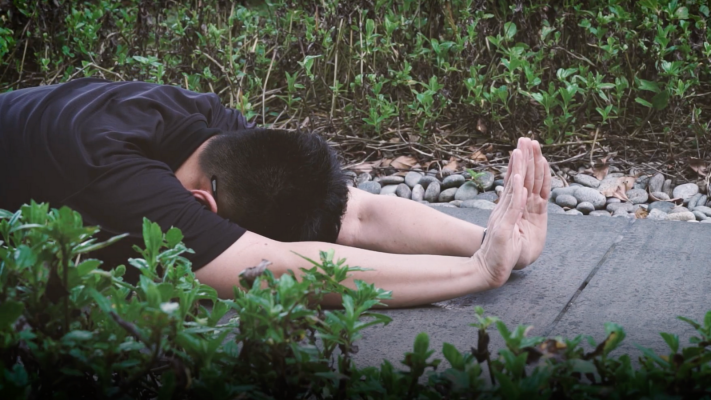Through the act of prostrating and taking refuge in the Three Jewels, we can purify our negative actions accumulated through our body, speech and mind. We purify karma accumulated from our body because our body is engaged in the act of something holy, which is the prostration itself. As we do the prostration and recite the refuge prayer “Namo Guru Beh, Namo Buddha Ya, Namo Dharma Ya, Namo Sangha Ya”, we are purifying the karma that we have accumulated from our speech. Finally, when we prostrate, there is a visualisation that accompanies the prostration.
Physically, prostrations benefit our body by increasing our endurance and purifying the negative body karma that causes diseases and illnesses. On a spiritual level, prostrations benefit our mind. For countless lifetimes, our actions and thinking have revolved around ourselves, namely, what we want to do, where we want to eat, what we want to study, how to be rich, how to be famous, etc. This habitual thinking makes us very well-practised at being self-centred. It is not our fault. We just have not been trained or taught in any other ways.
In a prostration retreat, we continuously prostrate and “lower ourselves”. Gradually, we will understand the need to modify our mindset and to destroy our ego. As we become less self-centric, we naturally open ourselves up more, and for those on the spiritual path, this increases our ability to absorb the Dharma.
Given the effectiveness of prostrations in purifying the karma of body, speech and mind, these are teachings on prostrations given by Tsem Rinpoche to a group of students before they embarked on a group retreat to accomplish 100,000 prostrations. These guidelines can be followed for all group or individual prostration retreats now and in the future.
Setting the motivation
As you engage in any retreat or Dharma activity, you should hold your motivation at the highest level. It is very, very important that you engage in Dharma practice free from the eight worldly concerns. This is an excellent guide for you to check your motivation.
You should also constantly contemplate on the benefits of engaging in Dharma work and activity. You should think that you are engaging in this retreat to transform your mind, purify your karma, create merits for your spiritual attainments and ultimately, be of benefit to many people.
To be free of the eight worldly concerns, you should avoid the following:
- to be happy when you are praised
- to be unhappy when you are insulted
- to be happy if you receive gifts
- to be unhappy if you don’t
- to be happy upon achieving reputation
- to be unhappy when you are unsuccessful
- to be happy when you are comfortable
- to be unhappy when you are not.
Throughout the retreat, you should maintain very clean and good samaya with your guru. Clean samaya with the guru is of utmost importance in the beginning, middle and end of any Dharma activity and practice.
If you are engaging in a group retreat with fellow Dharma students, you should be very harmonious and maintain good samaya with each other too. As you are collecting merits and purifying group karma collectively, group harmony, cooperation, sincerity and your united goals and motivation will help greatly to make your retreat more effective, powerful and meritorious.
Preparing for the prostration retreat
Before you start doing the retreat, you should prepare a beautiful altar with representations of the Buddha’s body, speech and mind. This is so that when you do your prostrations, you are prostrating to the Buddha’s body, speech and mind, thus creating the causes to attain the same. You should place on your altar:
- An image (statues, thangkas or pictures are permissible) of any Buddha you like
- An image of your Guru in front of the Buddha image
- A stupa
- A Dharma book (preferably the Lamrim Chenmo)
You should ensure that the place of the retreat is cleaned very well. Make offerings on your altar such as water offerings, eight sensory offerings, flowers, light or anything you think is beautiful. The more extensive your offerings the better.
If you are doing a group retreat with colleagues or fellow students, do not chatter idly or make jokes.
Preliminary prayers to begin each session
Sit in front of your altar and consciously think of why you are doing this practice, such as for purifying negative karma, creating merit to support your spiritual work, attainments and understanding of Dharma, or creating the causes to attain the qualities of the Buddha’s body, speech and mind to be of ultimate benefit to all sentient beings.
If this is too difficult, consciously think that you are engaging in this retreat so that everything stated in the Yonten Shigyurma prayers will come true.
Then recite the preliminary prayers:
- Taking Refuge and Generating Bodhicitta
- The Four Immeasurables
- Read the eight worldly concerns (to remind yourself that your Dharma activity must be free of these concerns)
- Nine Attitudes of Devotion to the Guru
- Lama Tsongkhapa’s Guru Yoga
- The 35 Confessional Buddhas Sutra (to be recited as many times as you wish)
- The four opponent powers
Spend some time in meditation to contemplate the prayers above, then begin your prostrations.
If you are doing a group retreat, the whole group should sit together to do these preliminary prayers.
The prostrations
Do your prostrations while visualising your Guru and yidam as one. There are short, medium and long prostrations, but for prostration retreats, you should engage in the long form.
Begin by standing with your feet shoulder-width apart, your body straight and hands folded, with your thumbs tucked inside your palms.
Then, recite:
- Namo Guru Beh, while touching your hands to the crown of your head
- Namo Buddha Ya, while touching your hands to your forehead
- Namo Dharma Ya, while touching your hands to your throat
- Namo Sangha Ya, while touching your hands to your heart
At the same time, you should think:
- As you touch your hands to the crown of your head and forehead, take refuge in your Guru and the Buddha. Think that you are purifying your negative body karma; that you create the causes to attain the same enlightened body as your Guru and the Buddha.
- As you touch your hands to your throat, take refuge in the Dharma and all enlightened speech. Think that you are purifying your negative speech karma; that you attain the same enlightened speech as the Buddha.
- As you touch your hands to your heart, take refuge in the Sangha and the enlightened mind. Think that you are purifying your negative mind karma; that you attain the same enlightened mind as the Buddha.
Go down, landing first on your knees. Put your hands down on the floor and slide yourself forward. As you go down, stretch your hands all the way forward in front of you until you are horizontally flat on the ground, face down, touching your forehead to the floor.
Slightly lift your palms off the floor, from the wrist.
Then rise out of the prostration as quickly as possible, signifying that you come out of samsara quickly.
Repeat each prostration as many times as you like, all the while meditating on the qualities of the Guru, Buddha, Dharma and Sangha.
If you get tired, sit quietly in front of your altar and rest until you wish to resume the prostrations. Contemplate on why you are doing this retreat.
You may use aids such as a mat, cushions, towels or gloves to ease your prostration practice.
Watch this two-part video of Tsem Rinpoche demonstrating how to engage in prostrations.
Dedication prayers
At the completion of each session of prostrations, recite:
- The 35 Confessional Buddhas Sutra
- Completion dedication prayers
- Yonten Shigyurma
- Any additional dedication prayers that you wish
If you are doing a very long retreat, it is good to do a black tea (serkym) offering and prayer before reciting the dedication prayers in each session. This helps to clear obstacles during the course of your retreat.
At the completion of the whole retreat, when you have achieved the number of prostrations you set out to do, it is very good to seal the merits of your retreat by doing a Lama Chopa puja.
There are two options:
- Sponsor and participate in a Lama Chopa Tsog puja and request tantrikas to recite the tsog section.
- Recite the Lama Chopa puja (without tsog) on your own as a wonderful dedication.
Things to remember
During the course of your retreat, you must do a minimum of one session every day, with a minimum of three prostrations in each session. This is very important for maintaining continuity throughout the retreat. If you break this daily requirement, all previous sessions will be nullified, and you will have to start all over again!
You can do as many sessions per day as you like. One complete session includes:
- Preliminary prayers and meditation
- Prostrations
- Dedication prayers
If you leave halfway through a session, then that session cannot be counted.
If you are doing the retreat as a group, the whole group must participate in every session for it to be included in your collective count.
It is extremely good if you make continuous offerings throughout the retreat such as candles, sensory offerings and all beautiful, good things. This helps you tremendously to create even more merit to support your practice and retreat.
You can also choose to sponsor retreatants to do prostrations if you are unable to do it yourself or do not have the time. For example, you can offer a sum of money to the Dharma centre when a retreatant has completed a stipulated number of prostrations. This is also an extremely beneficial practice for sponsors which will help them to create the causes to engage directly in this Dharma practice themselves in the future.
During the retreat, you should not talk or make jokes. Keep your handphone on silent mode to allow you to focus better on your meditations.
Negative, difficult things may arise during the retreat. Regard these as purification of your karma that arises as you are doing the prostrations. It is considered a very good sign if these negative things arise during retreats so you should not talk about it to others and complain. Think of these difficulties as good opportunities to control your mind and speech.



